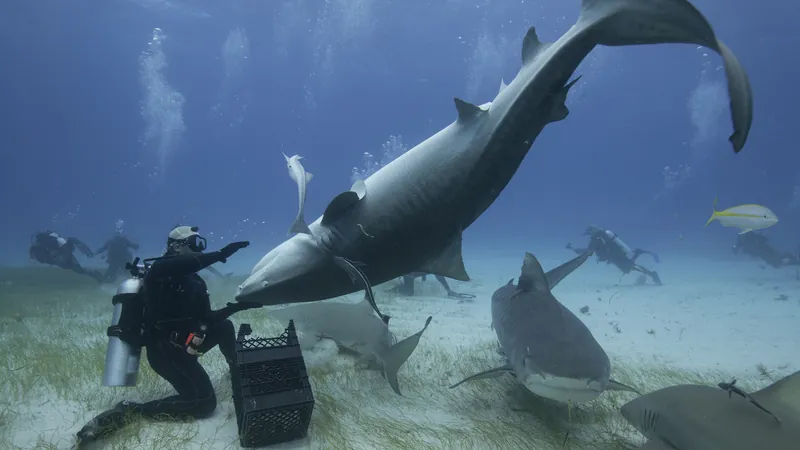
The Secrets Behind Sharks' Trance: Why They Freeze When Flipped Upside Down
2025-07-19
Author: John Tan
The Mystifying State of Tonic Immobility
Sharks are fierce predators, yet when flipped upside down, many species fall into a trance-like state known as tonic immobility. In this state, they become as defenseless as a beetle on its back.
Joel Gayford, a marine ecology doctoral candidate at James Cook University in Australia, describes tonic immobility as being akin to hypnotizing a shark. "The animal completely stops swimming, only displaying slow rhythmic breathing," he noted.
Unpacking the Mechanism of Tonic Immobility
What exactly happens to a shark during this curious phenomenon? Tonic immobility leads to reduced sensory responsiveness, lowered heart rate, decreased blood pressure, and even analgesia, or reduced sensitivity to pain. Abraham Miranda-Páez, a researcher at the Mexican nonprofit Pelagios Kakunjá, expands on this, stating that certain shark species—including the great white, lemon, and gray nurse sharks—can be triggered into tonic immobility by flipping them over or stimulating their snouts.
This state not only provides researchers with a unique opportunity to study these magnificent creatures safely but also reduces stress for the sharks. As Jillian Morris from Sharks4Kids remarks, researchers can quickly and humanely implant acoustic tags during these moments.
Why Did Sharks Evolve This Odd Trait?
While it aids scientific research, the question remains: why did sharks evolve this confounding ability? Several theories are under scrutiny.
A recent 2023 study in Environmental Biology of Fishes suggests tonic immobility may serve as a defense mechanism, a courtship ritual, or a way to cope with sensory overload. Miranda-Páez explains, "The scientific consensus leans toward tonic immobility being a passive defensive response. However, skepticism exists." Gayford cautions that playing dead might not deter most shark predators, who wouldn't be phased by a motionless target.
An Advantage or a Disadvantage?
Interestingly, orcas exploit this state to incapacitate sharks, making it a double-edged sword. In courtship, female sharks also experience tonic immobility when flipped by males during mating—yet this alone doesn’t elucidate its purpose. Morrison's insights suggest it could have multiple functions.
An Evolutionary Artifact?
Not all scientists agree on the function of tonic immobility. A 2025 study published in Reviews in Fish Biology and Fisheries indicates that it may be an evolutionary leftover. Gayford mentions that some shark species have lost this response entirely, suggesting that it could be disadvantageous in certain environments, like when navigating tight spaces while hunting.
While the exact purpose of tonic immobility remains unresolved, it continues to captivate marine biologists and shark enthusiasts alike, highlighting the intricate relationship between evolution and behavior.




 Brasil (PT)
Brasil (PT)
 Canada (EN)
Canada (EN)
 Chile (ES)
Chile (ES)
 Česko (CS)
Česko (CS)
 대한민국 (KO)
대한민국 (KO)
 España (ES)
España (ES)
 France (FR)
France (FR)
 Hong Kong (EN)
Hong Kong (EN)
 Italia (IT)
Italia (IT)
 日本 (JA)
日本 (JA)
 Magyarország (HU)
Magyarország (HU)
 Norge (NO)
Norge (NO)
 Polska (PL)
Polska (PL)
 Schweiz (DE)
Schweiz (DE)
 Singapore (EN)
Singapore (EN)
 Sverige (SV)
Sverige (SV)
 Suomi (FI)
Suomi (FI)
 Türkiye (TR)
Türkiye (TR)
 الإمارات العربية المتحدة (AR)
الإمارات العربية المتحدة (AR)